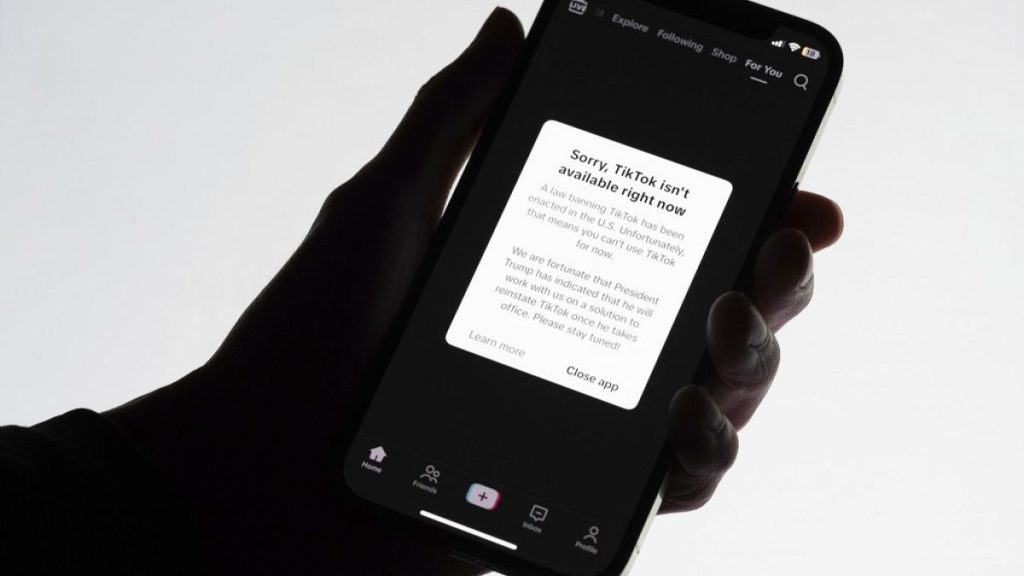The popular social media platform TikTok became inaccessible to millions of users in the United States on Saturday evening, following a federal ban that mandated its removal from major app stores like Apple and Google. Upon opening the app, users were greeted with a message stating that TikTok was unavailable due to the newly enacted law. The message also alluded to President-elect Donald Trump’s previous pledge to “save” the platform, expressing hope for a solution that would reinstate TikTok. Users were directed to the TikTok website, where they encountered the same message and were offered the option to download their data – a process that TikTok had previously indicated could take several days. The sudden blackout of the platform occurred mere hours before the ban officially went into effect.
Prior to the full blackout, TikTok had informed users of a temporary service disruption and assured them that it was working to restore service as soon as possible. However, the duration of the platform’s unavailability remained uncertain. President-elect Trump, in an interview, hinted at the possibility of a 90-day extension for TikTok, a move that could potentially be announced on his inauguration day. This represented a shift in stance for Trump, who had previously favored a ban on the platform. Adding to the intrigue, TikTok CEO Shou Chew was expected to attend Trump’s inauguration with prominent seating. The unfolding situation left users and observers alike in suspense, with the future of TikTok in the US hanging in the balance.
The ban on TikTok stemmed from long-standing concerns among US lawmakers and officials regarding the app’s potential national security risks, primarily due to its ownership by the Chinese technology company ByteDance. These concerns centered on the possibility of the Chinese government accessing vast amounts of US user data collected by TikTok and manipulating the platform’s algorithm to influence content in undetectable ways. While the US government had not publicly presented concrete evidence of such actions, the perceived threat was significant enough to prompt legislative action. The federal law, passed as part of a larger aid package, required ByteDance to sever ties with TikTok by Sunday or face a nationwide ban. This move led to a legal challenge from TikTok and ByteDance, who argued that the ban infringed upon First Amendment rights.
The Biden administration, while defending the law in court, emphasized its concerns about potential data collection and algorithmic manipulation by the Chinese government. The administration argued that the sheer scale of user data collected by TikTok posed a significant risk. Additionally, officials worried that the app’s algorithm, which determines the content users see, could be subtly manipulated by Chinese authorities to promote certain narratives or suppress others. Although no concrete evidence had been publicly disclosed, the administration’s arguments underscored the perceived threat to national security. Alongside government concerns, many parents and educators also voiced worries about the potential negative impact of excessive TikTok use on the well-being and mental health of teenagers.
The Supreme Court’s unanimous decision on Friday paved the way for the ban’s implementation. The court ruled that the potential national security risks associated with TikTok’s Chinese ownership outweighed concerns about limiting free speech for the app and its 170 million US users. Following the ruling and the subsequent service disruption, some individuals in China criticized the US, accusing it of suppressing the popular platform. Hu Xijin, a prominent Chinese political commentator, described the situation as the “darkest moment in the development of the internet,” accusing the US of hypocrisy for suppressing an online platform while championing free speech. The contrasting reactions highlighted the geopolitical tensions surrounding the TikTok ban.
In the wake of the Supreme Court ruling, both the White House Press Secretary and the Deputy Attorney General indicated that the implementation of the law would be left to the incoming Trump administration. However, TikTok’s subsequent announcement that it would be forced to “go dark” unless tech providers like Apple, Google, and Oracle received clear guidance from the administration created further confusion. The White House dismissed TikTok’s demand as a “stunt,” but the uncertainty surrounding the platform’s future persisted until the service disruption began. The law itself prohibited app stores from offering TikTok and hosting services from delivering its content, with hefty fines for violations.
While the law didn’t explicitly mandate TikTok to shut down its platform, it remained unclear whether the company voluntarily ceased operations or was forced to do so due to the withdrawal of support from its technology providers. Adding another layer of complexity, artificial intelligence start-up Perplexity AI submitted a proposal to merge with TikTok’s US operations, but without acquiring the crucial algorithm that drives the platform’s popularity. This, along with previous expressions of interest from investors like “Shark Tank” star Kevin O’Leary and former Treasury Secretary Steven Mnuchin, suggested that the future of TikTok in the US, while uncertain, might still involve some form of continuation under different ownership or structure.














